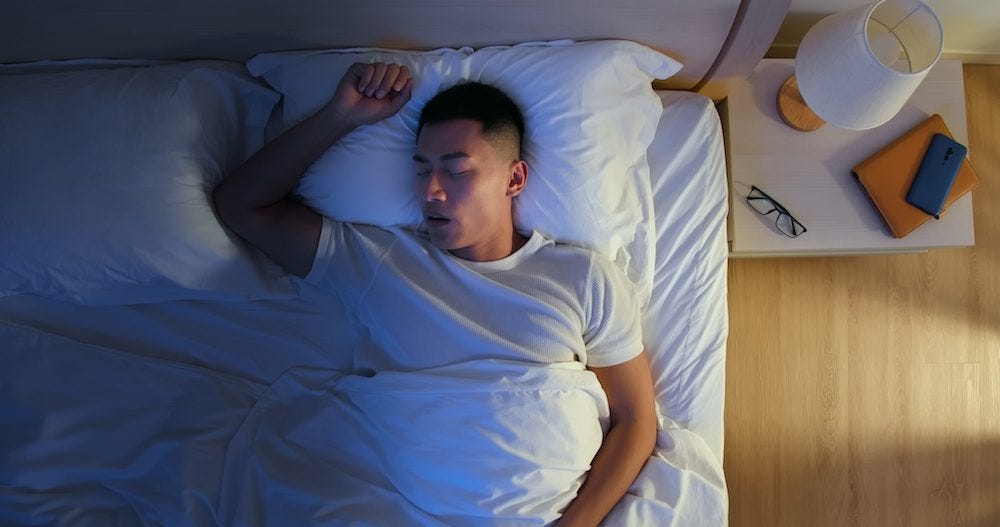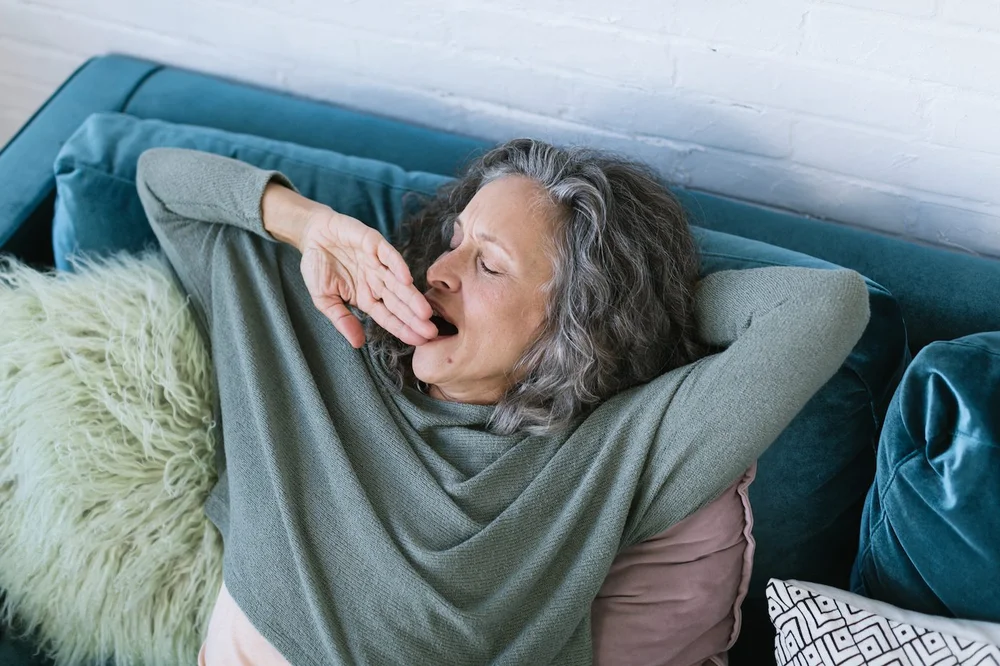7 Natural Ways to Get a Better Night’s Sleep
Scientifically Reviewed by Nicole Avena, PhD.
Wouldn’t it be nice if you had a mental “off” switch you could flip every time you were ready to go to sleep?
Wouldn’t it be nice if you could sleep eight hours straight, without any disruptions?
Wouldn’t it be nice if you could get restorative sleep every night?
I’m guessing you’d say yes to all these hypothetical questions. Sadly, such idealistic notions rarely apply to reality.
The Truth About Sleep
According to the Institute of Medicine (US) Committee on Sleep Medicine and Research, as many as 70 million Americans have ongoing sleep problems that interfere with their daily functioning. If you’re one of those who fail to get consistent sleep each night, you might be at risk for a host of physical and mental issues.
When you don’t get enough sleep, you may have overall lowered blood flow to your brain, which can disrupt your thinking, memory, and concentration.
Also, lack of sleep can weaken your immune system and make you more susceptible to getting a cold, flu, or virus. Getting quality sleep each night can help your brain function at optimal levels, as well as support your overall immunity and wellness.
Though minimal required levels of sleep vary, researchers agree that adults should try to get an average of 7 to 9 hours of sleep per night.
Sleep Stealers
Many factors contribute to millions of people missing out on a good night’s sleep. Here are just a few:
- Room temperature: Having a bedroom that’s either too hot or too cold may prevent you from getting a good night’s sleep.
- Light in the bedroom: Light from outside (coming in through blinds/curtains) or inside (from alarm clocks, electronics, power strips, etc.) can simulate daylight and disrupt your internal clock.
- Excessive noise: A neighbor or roommate’s blaring music, TV, or computer can prevent you from getting peaceful Zzzs.
- Gadgets by the bed: A computer, TV, or cell phone can keep you from falling asleep since they emit a type of light that can impair the brain’s sleep triggers.
- Going to bed worried or angry: This can also include obsessive or anxious thoughts and mood issues.
- Medications: Many medications – including asthma medications, antihistamines, cough medicines, anticonvulsants, stimulants, and SSRIs – can disturb sleep.
- Caffeine: Too much caffeine from coffee, tea, chocolate, or some caffeinated dietary supplements (especially when consumed later in the day or at night) can disrupt sleep.
- Alcohol, nicotine, and marijuana: Although these compounds initially induce sleepiness for some people, they can have the reverse effect as they wear off, waking you up after a few hours of sleep.
- Gastrointestinal problems: Reflux, cramps, and diarrhea can prevent or interrupt sleep.
- Women’s issues: Pregnancy, PMS, menopause, and perimenopause cause fluctuations in hormone levels that can disrupt the sleep cycle.
- Men’s issues: Prostate problems can cause frequent trips to the bathroom, which can interrupt your sleep.
- Snoring: Loud snoring can cause you, your partner, or everyone in the house to lose sleep.
- Shift work: Nurses, firefighters, security personnel, truck drivers, airline pilots, and many others work at night and sleep by day. These shift workers are especially vulnerable to irregular sleep patterns, which can lead to excessive sleepiness, reduced productivity, irritability, mood problems, and long-term health issues.
- Jet lag: International travel across time zones wreaks havoc with the body’s natural sleep-wake cycle.
- Stressful events: The death of a loved one, divorce, a major deadline at work, or an upcoming test can cause temporary sleep loss.
These, and other factors, can conspire to steal your sleep.
Though there are many things that can rob sleep, there are also many sleep aids that can make a big difference in how well you rest at night.
Here are a few things you can do to improve the quality of your sleep.
7 Natural Ways to Get Better Sleep & Improve Your Health

1. Regular Sleep Time
Go to bed at the same time each night and wake up at the same time each morning, even on weekends. Instead of taking a nap to make up for lost sleep, power through until bedtime to maintain a regular sleep schedule.
2. Reduce Snoring
Sleeping on your back tends to make snoring worse because the tongue slides toward the back of the throat. Sleeping on your side, with a pillow that keeps your head slightly elevated, is usually recommended to reduce snoring. If you share the room with someone who snores, try wearing earplugs.
3. Clear Your Head Before Bed
Instead of going to bed worried or angry, try to settle emotional problems before going to sleep. Send a positive text, email, or write down an issue to deal with the next day.
Once all matters have been resolved or tabled, forget about them. Clear your mind of stress so you can enter a relaxed state that can lead to peaceful sleep.
4. Get Regular Exercise
Physical exercise is one of the most important things you can do to keep your brain healthy. Exercise boosts blood flow to transport nutrients to the brain. It also stimulates the brain to make new cells and tune-up existing cell networks that help the brain self-regulate.
However, be careful not to exercise within four hours of the time you go to bed. For some people, vigorous exercise late in the evening generates so much energy it can keep them awake.
5. Don’t Take Naps
This is one of the biggest mistakes you can make if you have trouble sleeping. Taking naps when you feel sleepy during the day may disrupt your nighttime sleep cycle. For people who are older, short naps in the middle of the day can be helpful.
6. Use Sound Therapy
Instead of being awakened by every noise you hear, try sound therapy. This type of therapy can induce a peaceful mood and help lull you to sleep.
Consider soothing nature sounds, wind chimes, or soft music. Slower classical music, or any music that has a slow tempo of 60 to 80 beats per minute, can help promote the onset of sleep.
7. Natural Sleep Support – Sleep Supplements
Getting high-quality sleep is essential for optimal brain and body health. If you have healthy habits, such as avoiding caffeine later in the day and getting regular exercise, but still have problems falling asleep, a scientifically formulated and safe dietary supplement that promotes restful sleep may give you the relief you need.
Whether you’re too wired, worried, or stressed to sleep, nutritional sleep aids can help improve the quality of your sleep.
These are 3 of the best natural ways to get better quality sleep…
Restful Sleep
Restful Sleep contains the body’s own sleep hormone, melatonin, to get you to sleep and keep you asleep through the night. It also includes the calming neurotransmitter GABA, as well as the calming mineral magnesium, vitamin B6, and valerian.
This nutritional-herbal combination produces a soothing effect that can help ease you into a peaceful sleep.
- Melatonin – melatonin is a hormone naturally produced by the brain to initiate sleep and carry you through your daily sleep/wake cycle. When taken by mouth, it promotes restful sleep and healthy sleep patterns.
- Vitamin B6 – vitamin B6 helps with the production of neurotransmitters (serotonin, dopamine, norepinephrine, and GABA), which need to be balanced for healthy sleep.
- Magnesium – sometimes called “the relaxation mineral,” magnesium plays an important role in enhancing GABAs calming actions that allow for sleep; for energy production that helps the brain maintain its internal clock; and with muscle relaxation. Magnesium helps calm the mind and enhance overall sleep quality.
- GABA – GABA is the brain’s major calming neurotransmitter, inducing calm by inhibiting excessive firing of neurons distributed throughout the brain.
- Valerian – an herb used traditionally for centuries for its calming and sleep-inducing effects, valerian contains GABA and may also work closely with GABA receptors (molecular sensors) on brain cells to help calm brain activity. It supports deep, restful, quality sleep.
Restful Sleep eases you to sleep and helps you stay asleep all night so you can wake up feeling refreshed in the morning.
Put Me To Sleep
Put Me To Sleep is based on the most recent nutraceutical research on sleep onset, duration, and quality. The body’s daily sleep phase is now recognized to be just as important for health as the awake phase. Sleep is vital for mental and physical performance, as well as overall health and well-being.
This highly effective sleep supplement includes 6 potent ingredients that work in concert to help relax the mind and body in preparation for sleep. These ingredients have a broad range of neurotransmitter actions in the brain. They are carefully combined in this supplement to promote recovery from daily stress, calm and relaxation, and fully restful sleep.
[wc_row]
[wc_column size=”one-half” position=”first”]
[/wc_column]
[wc_column size=”one-half” position=”last”]
- Melatonin – recent research suggests greater sleep benefits from taking lower levels of melatonin, as offered in this formulation.
- GABA – chemically identical to the GABA neurotransmitter, and proven to enhance brain function when taken by mouth.
- L-Theanine – a unique green tea amino acid that works quickly to reinforce GABA’s natural relaxant actions.
- Magnesium – reinforce GABA’s calming effects and helps bring on sleep and maintain sleep quality.
- Vitamin B6 – vital for the brain’s entire spectrum of functions as well as those needed for quality sleep.
- 5-HTP – an important starting molecule for the brain to produce not just serotonin, a regulatory transmitter that enables quality sleep, but also melatonin.
[/wc_column]
[/wc_row]
This breakthrough chewable supplement helps bring on deep, sustained, and quality sleep.
Magnesium Chewables
Magnesium is a mineral nutrient essential for over 300 enzymes fundamental to every cell, tissue, and organ in the body. Sadly, due to the Standard American Diet (SAD), magnesium is one of the minerals most people typically don’t get enough of in the foods they eat. Surveys consistently indicate more than half of all Americans aren’t getting sufficient amounts of magnesium from their foods.

These chewable vitamins include:
- Magnesium – all three magnesium sources (magnesium citrate, magnesium malate, and magnesium glycinate) are pre-activated and ready for use by the brain and other organs. These magnesium compounds were carefully selected to be well tolerated and safe to take long-term by people of all ages.
Magnesium Chewables are sugar-free and have a delicious citrus flavor. Each tablet provides 150 milligrams of magnesium, more than one-third of your daily requirement.
These vegan tablets are free of poorly-absorbed magnesium oxide, dairy, glutens, corn, egg, yeast, or other allergens, with no artificial colorings or flavorings.
Sleep Well
These 3 supplements provide safe and clinically proven ingredients that can help you cope with stress, fend off negative or fretful thoughts, and get the great night’s sleep your brain – and body – needs.
Try these natural calming tips today to help you sleep well tonight!
At BrainMD, we’re dedicated to providing the highest purity nutrients and standardized herbal ingredients to support your sleep and overall well-being. For more information about our full list of supplements, please visit us at BrainMD.





